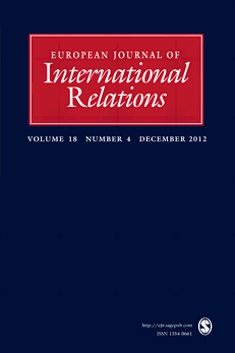
EUROPEAN JOURNAL OF INTERNATIONAL RELATIONS
Scope & Guideline
Connecting researchers to the forefront of global analysis.
Introduction
Aims and Scopes
- Theoretical Innovation in International Relations:
EJIR emphasizes the development of new theoretical frameworks and critiques of existing paradigms in international relations. This includes explorations of critical theory, constructivism, and postcolonial perspectives that challenge traditional approaches. - Interdisciplinary Approaches:
The journal encourages the integration of insights from various disciplines, such as sociology, political science, economics, and cultural studies, to enrich the analysis of international phenomena. - Focus on Global Governance:
EJIR regularly publishes research on international organizations, global governance structures, and the implications of international law and norms in contemporary politics, addressing both successes and failures. - Critical Examination of Power Dynamics:
The journal highlights studies that interrogate power relations in international politics, including the roles of state and non-state actors, the impact of globalization, and the effects of historical legacies on current international interactions. - Contemporary Global Issues:
Research addressing pressing global challenges such as migration, climate change, security threats, and human rights is a consistent focus, reflecting the journal's commitment to relevance in current affairs.
Trending and Emerging
- Migration and Asylum Governance:
Recent publications emphasize the governance of migration and asylum, examining the implications of policy and practice on the ground. This theme highlights the urgent need to address the human aspects of migration in the context of global crises. - Technocracy and Populism:
There is an emerging focus on the interplay between technocratic governance and populist movements, exploring how these dynamics influence the legitimacy and functioning of international organizations. - Human Rights and Security:
The journal is increasingly publishing work that interrogates the connections between human rights, security, and state behavior, particularly in conflict and post-conflict settings, as well as in the context of global health crises. - Geopolitical Analysis of Technology:
Research addressing the geopolitical implications of technology, including cybersecurity, digital diplomacy, and the role of private actors in global governance, is on the rise, reflecting the intertwining of technology and international relations. - Climate Change and Environmental Politics:
The journal is seeing a growing interest in the intersection of climate change and international relations, with studies focusing on environmental governance, ecological security, and the roles of various actors in addressing global environmental challenges.
Declining or Waning
- Traditional State-Centric Approaches:
There is a noticeable decline in papers centered solely on traditional state-centric analyses, possibly due to the increasing recognition of non-state actors and transnational issues that complicate the binary of state versus non-state. - Simplistic Realist Frameworks:
Research adopting a purely realist perspective seems to be waning, as scholars increasingly seek to incorporate more nuanced views that consider the roles of norms, identity, and agency in international relations. - Focus on Historical Case Studies:
While historical analysis remains important, there is a trend towards favoring contemporary case studies that address current international challenges over purely historical explorations, reflecting a shift in scholarly interests. - Reduction in Theoretical Homogeneity:
There appears to be a decrease in publications that adhere strictly to a single theoretical framework, indicating a growing preference for eclectic and pluralistic approaches to international relations.
Similar Journals

INTERNASJONAL POLITIKK
Bridging Research and Real-World ImpactINTERNASJONAL POLITIKK is a prominent peer-reviewed journal published by the Norsk Utenrikspolitisk Institutt in Norway, focusing on the multifaceted domains of Political Science and International Relations. With an ISSN of 0020-577X and an E-ISSN of 1891-1757, this journal has transitioned to an Open Access format since 2016, facilitating broader access to vital research. It is noted for its critical analyses and explorations of contemporary international issues, aiming to bridge academic research and public policy debates. Given its ranking in the Q3 category for both Political Science and Sociology and Political Science, as reported in 2023, the journal has carved out a significant niche among scholars and practitioners alike. Researchers are encouraged to contribute their findings and insights as the journal continues to serve as a platform for thought-provoking discourse, especially in a rapidly changing global landscape.

AJIL Unbound
Unleashing Ideas for a Boundless Legal FutureAJIL Unbound is an esteemed open-access journal published by Cambidge University Press that has been serving the legal academic community since 2013. With its focus on international law and related social science disciplines, this journal offers a platform for innovative research and critical discourse in the field. Thanks to its robust engagement features and commitment to accessibility, AJIL Unbound facilitates the dissemination of knowledge while fostering scholarly communication among researchers, practitioners, and students. With a notable ranking of #192 out of 1025 in the realm of Social Sciences Law, it stands in the 81st percentile, showcasing its influence and reach within the legal field. Its open-access model enhances visibility and encourages wider participation in discussions surrounding pressing legal issues. As the journal continues to converge its objectives from 2013 to 2024, it remains a vital resource for academics looking to explore contemporary legal challenges and advancements.
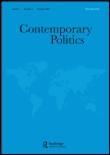
Contemporary Politics
Decoding the Nuances of International RelationsContemporary Politics is a distinguished academic journal published by Routledge Journals, Taylor & Francis Ltd, specializing in the fields of Political Science, International Relations, and Sociology. With an ISSN of 1356-9775 and an E-ISSN of 1469-3631, the journal has carved out a significant place in academia, evidenced by its impressive Q1 ranking in both Political Science and Sociology categories for 2023. The journal's impact is further underscored by its Scopus rankings, placing it in the top 15% of Political Science and International Relations journals and among the top 18% in Sociology. Covering a breadth of contemporary issues from 1995 to 2024, it strives to foster insightful discourse and innovative research that illuminates the complexities of modern political landscapes. While the journal is not open access, it remains an essential resource for scholars, policymakers, and educators seeking to explore critical political dynamics and social phenomena. Based in the United Kingdom, Contemporary Politics serves as a pivotal platform for disseminating research that contributes to the understanding of pressing global issues.
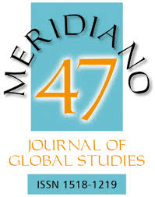
Meridiano 47-Journal of Global Studies
Navigating the Intricacies of Global Studies for a Better TomorrowMeridiano 47-Journal of Global Studies is a premier publication dedicated to the interdisciplinary exploration of global studies, a field that encompasses the complexities of international relations, socio-economic dynamics, and cultural interactions across borders. Published by the Instituto Brasileiro de Relações Internacionais, this journal has been an open-access platform since 2000, ensuring wide accessibility and dissemination of knowledge to researchers, professionals, and students alike. With its commitment to fostering critical discussions and innovative research in the realm of global dynamics, Meridiano 47 serves as a vital resource for those seeking to understand the intricacies of our increasingly interconnected world. By publishing high-quality articles that engage with contemporary issues and theoretical frameworks, the journal plays a significant role in shaping academic discourse and informing policy debates. Located in Brasília, Brazil, the journal contributes to a rich tradition of scholarship in global studies and invites submissions that advance collective understanding of global phenomena.
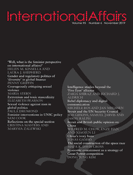
INTERNATIONAL AFFAIRS
Unraveling the Threads of Political ScienceINTERNATIONAL AFFAIRS, published by OXFORD UNIVERSITY PRESS, stands as a premier journal in the fields of political science and international relations, boasting an impressive Impact Factor and a reputation for rigorous scholarship. Established in the United Kingdom, the journal's ISSN is 0020-5850 and its E-ISSN is 1468-2346. From its inception to the present, it has played a crucial role in analyzing and interpreting global issues that shape our world, with a notable mention of its Q1 quartile ranking in both Political Science and Sociology according to 2023 metrics. Researchers and practitioners alike benefit from its high-quality, peer-reviewed articles, which consistently rank it in the top percentile of its category, underscoring its significance in contemporary discourse. As the journal continues to evolve, it remains a vital resource for those looking to deepen their understanding of international affairs and sociopolitical dynamics.
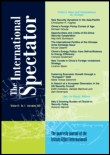
International Spectator
Navigating the Intricacies of International Relations.International Spectator, published by Routledge Journals, Taylor & Francis Ltd, stands as an eminent peer-reviewed journal in the field of Political Science and International Relations. Established in 1983 and continuing its impactful discourse through 2024, the journal boasts a commendable Q1 ranking in 2023, confirming its position among the top-tier journals within its discipline. With a Scopus ranking of 121 out of 706, it lies in the 82nd percentile, showcasing the robustness of its scholarly contributions. Although not designated as an open-access journal, International Spectator remains essential reading for researchers, professionals, and students seeking to navigate the complexities of international politics. The journal aims to publish high-quality research that engages with global political dynamics, providing a platform for innovative ideas and critical analyses that shape the understanding of international relations today.

Uluslararasi Iliskiler-International Relations
Exploring the Dynamics of Global GovernanceUluslararasi Iliskiler-International Relations is a prominent academic journal dedicated to the multifaceted field of Political Science and International Relations. Published by the ULUSLARARASI ILISKILER KONSEYI DERNEGI, the journal serves as a vital platform for the dissemination of research that addresses contemporary global challenges and theoretical advancements, contributing to the evolving discourse in international affairs. With an ISSN of 1304-7310 and an E-ISSN of 1304-7175, the journal currently holds a respectable Q2 category ranking based on the 2023 assessment in its field, situating it among the top tier of scholarly publications. The journal's scope encompasses a wide range of topics, including international security, diplomacy, and global governance, encouraging contributions from scholars, practitioners, and students alike. As an open-access journal, Uluslararasi Iliskiler not only enhances the visibility of research findings but also promotes a collaborative environment for addressing the pressing issues of our time. By fostering rigorous academic dialogue, this journal continues to make significant contributions to the political science landscape, thus benefiting a diverse readership committed to understanding and shaping international relations.
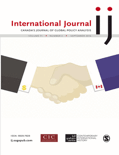
INTERNATIONAL JOURNAL
Illuminating the Path of Political TheoryWelcome to the International Journal, a premier academic publication in the fields of Political Science and International Relations, published by SAGE Publications Ltd.. With a distinguished history dating back to 1981, this journal has become a vital resource for scholars and practitioners worldwide, offering insights into complex global issues and fostering critical discourse. As of 2023, it proudly holds a Q2 category ranking, reflecting its influential position within the academic community, as evidenced by its Scopus ranking of #288 out of 706 in the related fields. The journal provides non-open access articles, ensuring high-quality peer-reviewed content that is accessible through institutional subscriptions. By maintaining rigorous editorial standards and promoting interdisciplinary research, International Journal continues to contribute significantly to the evolution of political theory and international studies, making it essential reading for anyone committed to understanding the dynamics shaping our world today.
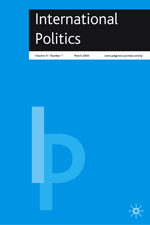
International Politics
Illuminating Key Issues in International RelationsInternational Politics, published by PALGRAVE MACMILLAN LTD, stands as a pivotal scholarly resource in the field of international relations and political science. With a strong impact factor and a commendable ranking within the Q1 and Q2 quartiles for 2023, the journal is recognized for its rigorous analysis and insightful contributions to both theoretical and practical aspects of global politics. Covering a wide array of topics, from geopolitical strategies to socio-economic transformations, it serves as an essential platform for researchers, professionals, and students alike. The journal, ISSN 1384-5748 and E-ISSN 1740-3898, is based in the United Kingdom and has been converging knowledge since 1996, continuing to provide relevant and authoritative perspectives up until 2024. Despite its lack of Open Access options, the journal remains a wealth of information for anyone engaged in the intricate web of international affairs, ensuring that quality research continues to shape the discourse in this vital field.

OASIS-Observatorio de Analisis de los Sistemas Internacionales
Championing Open Access to International KnowledgeOASIS-Observatorio de Analisis de los Sistemas Internacionales is a leading academic journal dedicated to the field of international studies and relations. Published by UNIV EXTERNADO COLOMBIA, DEPT PUBLICACIONES, this journal has been an Open Access platform since 1995, promoting the dissemination of knowledge and research without barriers to access. With the ISSN 1657-7558 and E-ISSN 2346-2132, OASIS provides a vital forum for scholars, professionals, and students interested in contemporary global issues, political dynamics, and international cooperation. While the journal's H-index is not specified, its commitment to high-quality research is reflected in its rigorous peer-review process and dedication to advancing the understanding of international systems. Scholars in the field will find in OASIS a rich repository of articles, case studies, and critical analyses that contribute significantly to the academic discourse surrounding international relations.